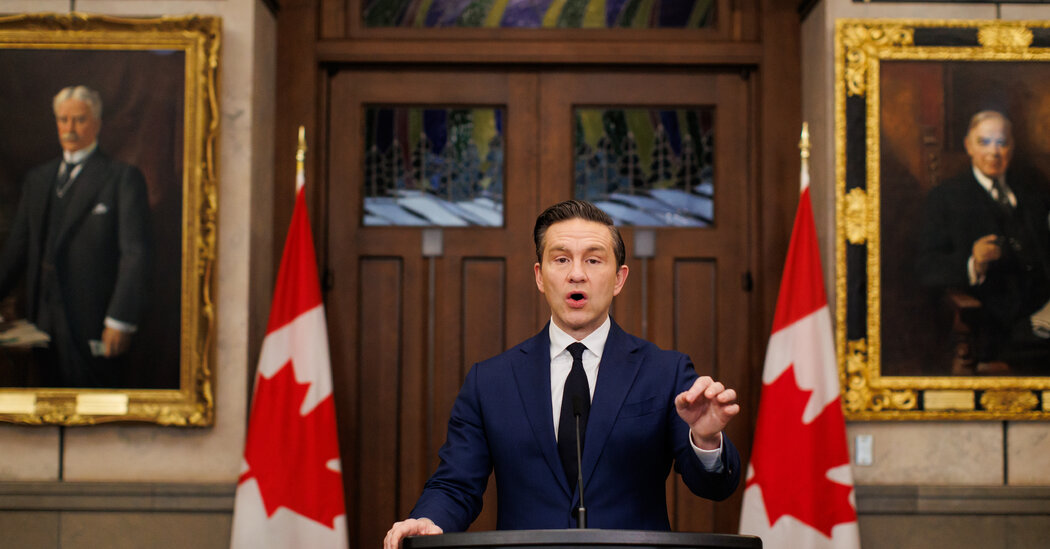Pierre Poilievre, the man who is the favorite to become Canada’s next leader, has painted his country as “broken” and ridden with “crime and chaos.” He has derided Prime Minister Justin Trudeau as a “wacko” and his ministers as “crazy,’’ “disastrous,’’ “incompetent and discredited.’’
In Parliament, he called a leftist opposition leader and former Trudeau supporter “a fake, a phony and a fraud’’ and a “sellout.’’ Enraged, the leader stood up from his seat, walked into the aisle, and yelled, “I’m right here, bro.”
“Do it,’’ Mr. Poilievre shot back as the House speaker struggled to restore calm and pleaded that lawmakers respect “the rules that we have.’’
Mr. Poilievre, 45, the opposition Conservative Party leader, has been stretching the rules in Canada’s political discourse with a combative, attack-driven style and an anti-elite, populist message that has been described as authentic by supporters and Trumpian by critics.
So far, it’s worked.
For the past year, Mr. Poilievre and his party have enjoyed a double-digit lead in the polls over Mr. Trudeau and his Liberal Party. If the polls hold, Mr. Poilievre will emerge as the next prime minister in a general election that must be held by October but will most likely be held in the spring after Mr. Trudeau’s announcement on Monday that he would resign as party leader and prime minister once his party decides on a successor.
A career politician long known as a fierce attack-dog for his party, with an instinctive sense of the themes that resonate among voters, Mr. Poilievre has successfully pummeled the unpopular Mr. Trudeau in the past year and made him appear out of touch.
Mr. Poilievre drove the nation’s political agenda by handpicking issues — housing costs, inflation and immigration — that, according to many Canadians, Mr. Trudeau’s government had underestimated or mishandled.
But in a news conference announcing his resignation, Mr. Trudeau said that Mr. Poilievre’s “vision for this country is not the right one for Canadians,’’ adding that the opposition leader was not offering “an ambitious, optimistic view of the future.’’
Whether Mr. Poilievre can cling to his lead in the polls, or even build on it, as voters now get to know him better remains unclear. In the months ahead, the Liberal Party’s choice of a successor could yield a bump in the party’s popularity. And Mr. Poilievre, who became leader of the Conservatives in 2022, will have to campaign on his own agenda to win over mainstream voters.
“He’d be very different from any other prime minister we’ve had,’’ said Duane Bratt, a political scientist at Mount Royal University in Calgary, Alberta. “He’s been very combative, and he’s been like that his whole life. That’s great as an opposition leader, and even as a junior minister. But can he do that as prime minister?’’
Like other populist leaders, Mr. Poilievre has tapped into the post-pandemic frustrations of voters over rising living costs, unaffordable housing and what to many seemed like a smug Trudeau government that made big decisions — like increasing immigration to historical levels or imposing a carbon tax — without much explanation or consultation.
Three years ago, Mr. Poilievre was one of the few politicians to openly support truckers who paralyzed the center of Ottawa, the capital, for weeks to protest vaccine mandates.
“He’s channeled an anti-elitism in Canada,’’ said Lori Turnbull, a political scientist at Dalhousie University in Halifax, Nova Scotia. “It is populist, it is anti-institutional. That is a big part of his messaging.’’
Mr. Poilievre has pushed a traditionally conservative message of personal freedom, small government, lower taxes, being tough on crime and softer on regulations on Canada’s oil industry.
But he has laced his message with railings against “globalist Davos elites,’’ threatening to fire Canada’s central banker, embracing cryptocurrency and attacking the mainstream media, especially the public broadcaster, the C.B.C., which he has vowed to defund.
“The problem we’ve had in this country and in all of the countries that have been afflicted by this horrendous utopian wokeism is that it’s been focused on the grand, the grandiosity of the leadership of the egotistical personalities on top and not the things that are grand and great about the common people,’’ Mr. Poilievre said in a recent interview with Jordan Peterson, the Canadian psychologist and conservative social media star.
“And that is another reason why I think we’re doing very well,’’ Mr. Poilievre added. “People are saying, finally, there’s someone who’s focused on letting me take back control of my own life.’’
Elon Musk, the billionaire and one of President-elect Donald J. Trump’s most influential supporters, said “great interview” about Mr. Poilievre’s appearance on Mr. Peterson’s podcast. Mr. Musk appeared to embrace Mr. Poilievre even as he continued to belittle Mr. Trudeau.
“Girl, you’re not the governor of Canada anymore, so doesn’t matter what you say,’’ Mr. Musk posted on social media after Mr. Trudeau said there was not “a snowball’s chance in hell’’ that Canada would become part of the United States, as Mr. Trump has suggested.
In his personal life, Mr. Poilievre couldn’t be more different from Mr. Trudeau, who — as the son of Pierre Trudeau, who led Canada for nearly 16 years and helped define Canada’s modern identity — grew up in the prime minister’s official residence in Ottawa.
In an apparent effort to emphasize his modest origins, Mr. Poilievre has often told the story of how he was born in Calgary to a 16-year-old mother and given up for adoption. His adoptive parents were schoolteachers who separated when he was 12, after which his father came out as gay.
When he was elected Conservative Party leader in a landslide in 2022, he saluted his biological mother, his adoptive parents and his father’s longtime partner, all of whom were in the audience.
“We’re a complicated and mixed-up bunch, like most families, like our country,’’ said Mr. Poilievre, who supports same-sex marriage and abortion rights.
Mr. Poilievre has two young children with his wife, Anaida Galindo, a former Senate aide he met in Ottawa. Ms. Poilievre was born in Venezuela but grew up with her family in Montreal. Her husband has often referred to the benefits of immigration by citing as an example Ms. Poilievre’s family, saying they came to Canada “with almost nothing’’ and “like so many immigrant families, built our country.’’
Involved in conservative politics in Calgary since his early teens, Mr. Poilievre became the youngest member of Parliament when he was elected in 2004 at the age of 25. He rose quickly through the ranks, impressing older politicians with his hard work, acumen and combativeness, earning the nickname, “Skippy.’’
He tried to shed the image evoked by the nickname with a makeover in the summer of 2023. Abandoning navy blue suits and ties, he began appearing in public in jeans and sometimes tightfitting T-shirts. He jettisoned his squarish glasses for contacts and aviator sunglasses.
“He’s transformed his own image from this nerdy little guy with the glasses and scowl on his face all the time to this sort of Bitcoin bro who is appealing to young voters, male voters,’’ said Ms. Turnbull, the political scientist.
Mr. Poilievre said in the interview with Mr. Peterson that he had become “tougher” since becoming Conservative leader and was ready to become prime minister.
“It’s personal for me,’’ he said. “I don’t come from a privileged or wealthy background. I was adopted by schoolteachers, grew up in a normal suburban neighborhood. We didn’t always have money. But I was able to get here.”


